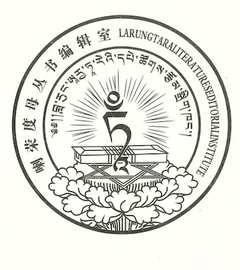Jomo Ta Wu
Jomo Ta Wu
from the Ḍākinīs' Great Dharma Treasury
Near the end of the Qing Dynasty, a woman from the Yen clan became known as Jomo Ta Wu.[1] She stayed at a Jo Monastery[2] associated with Kuan Yin (Avalokiteśvara) in Lantong.[3] In her home region, she gained renown for her immense diligence in meditation and the joy she took in helping others.
She was born in Lantong[4] in 1854, and when she was still quite young, her parents arranged for her to marry a noble from the Tsa clan. However, before they could marry, her fiancé passed away from an illness. She swore that she would not marry anyone in the future.
When she was about twenty years old, she took ordination at a nunnery dedicated to Kuan Yin in the south.[5] After her ordination, she endured every hardship without complaint, doing whatever work was needed at the monastery: carrying water, washing rice, cutting wood, cooking food, and every other task. She was also extremely diligent in her spiritual practice. Rising early and sleeping late, she dedicated herself to the holy Dharma. Always careful to renounce laziness, she constantly recited the name of Buddha Amitābha.
She would always tell others,
The Buddha’s teachings are so magnificent. There are countless gateways to the Dharma, but our gateway to the pure land is extremely swift.[6] Paying homage to Buddha, chanting, meditating, and offering incense—all of these practices are means of purifying obscurations. Once you purify your obscurations, it will be easy to reach accomplishment.
Over time, she became famous for such teachings.
Seeing that the outer and inner temples at Jo Monastery were in poor repair, she gathered resources from her family to renovate them all, both the facades and interiors.[7] Moreover, she cultivated a large vegetable field that fed all the people at the nunnery. It is said that whenever she saw someone struggling, she would donate what she could to them.
Late in her life, once she realized she had little time left, she embarked on a pilgrimage to Mount Putuo[8] and Mount Jiuhua.[9] During these years, she experienced numerous signs of spiritual accomplishment, and she felt an overwhelming sense of joy as all her deepest goals were fulfilled.
On the twenty-eighth day of the second month of 1927, showing no signs of illness, she wrote the following verse as her last testament:
If you completely abandon ordinary activities
And apply yourself to one-pointed recitation, your mind will be pure.
In a moment of perfect recollection, you will transcend the woes of this hard-to-bear world.
Once you have renounced desire, hostility, and ignorance,
Without a stitch of clothing on your back, you assume the naked body of luminosity.
With the dharmakāya evident, you are free from saṃsāra’s suffering. When you reach Sukhāvatī, all your pure aspirations will be perfected.
She then told her disciples that she could see the buddhas and bodhisattvas welcoming her and that it was time for her to go. As she said that, she sat up cross-legged and passed away. Five relics were found in her ashes.
This story was translated to Tibetan from Chinese sources by Khenmo Dawa Drolma.
| Translated by Joseph McClellan, 2025.
Bibliography
Tibetan Source
mkhan mo zla ba sgrol ma, trans. "jomo ta bos." (2017). In mkhaʼ ʼgroʼi chos mdzod chen mo (Par gzhi dang poʼi par thengs dang po, Vol. 8, pp. 316–317. Bod ljongs bod yig dpe rnying dpe skrun khang. MW3CN2459_87D7FA.
Version: 1.1-20250702
-
ta bos ↩
-
jo dgon ↩
-
lan thong—It is not clear where this is. Later in the text, it is spelled lan thung. Most LLMs consulted speculated that it could be Lanzhou, Gansu Province. One model suggested it might be an irregular transliteration of Nanjing, Jiangsu Province. ↩
-
Here, the spelling is lan thung. We assume it is the same place as lan thong. ↩
-
The exact location is not given. ↩
-
dag zhing ba'i chos sgo—referring to the path of faith and aspiration to be born in Amitābha's pure land. ↩
-
"From her family" interprets rang gi rgyu rdzas ("her own wealth"). Since she was a nun from a young age, this could only have come from her family. ↩
-
ri bo gru 'dzin—This likely refers to Mount Putuo (普陀山, Pǔtuó Shān) in Zhejiang Province. ↩
-
dpa' ri rtse dgu—Probably Mount Jiuhua (九华山, Jiǔhuá Shān) in Anhui Province, China. ↩
